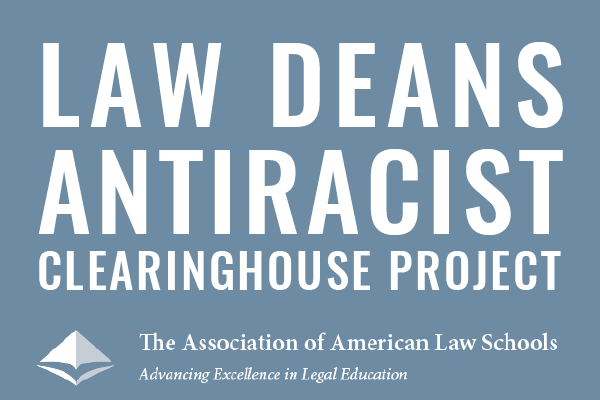A new initiative from the Association of American Law Schools has curated resources to help guide antiracism work in law schools.
The Law Deans Antiracist Clearinghouse Project is a recently launched effort offering resources and guidance for law schools across the US take overdue antiracist action. As stated on its webpage,
The AALS is taking various steps, including the curation of this webpage, to respond to racism in the United States, a scourge that threatens both our democracy and the rule of law.
By creating a space for our collective voices as leaders of law schools to engage our institutions in the fight for justice and equality, we strive to focus our teaching, scholarship, service, activism, programming, and initiatives on strategies to eradicate racism.
The resources provided by the Law Deans Antiracist Clearinghouse Project are curated by five law deans across the US:
- Dean Angela Onwuachi-Willig (Boston University School of Law, who also serves on the Massachusetts SJC Standing Committee on Lawyer Well-Being),
- Dean Kim Mutcherson (Rutgers Law School),
- Dean Carla D. Pratt (Washburn University School of Law),
- Dean Danielle Holley-Walker (Howard University School of Law), and
- Dean Danielle M. Conway (Penn State Dickinson Law).
The Project’s guidance for antiracist work spans 5 phases: (1) Listening, (2) Learning, (3) Leading, (4) Audit Reporting, and (5) Iterative. The Listening Phase provides guidance and statements from the team of deans listed above leading the Project. The Learning Phase offers resources in the forms books, articles, studies, websites, music, and art. The Leading Phase introduces the Penn State Dickinson Law faculty resolution condemning brutality and inequity against Black people as a template, and tracks law school adopters and faculty resolutions. The Audit Reporting Phase provides questions to help law deans “lean into this work.” And finally, the Iterative Phase requires schools to be transparent about the success of efforts to operationalize stated values and make meaningful adjustments to continue improving antiracist actions. As stated on the Project’s webpage,
To engage as Antiracists, we must listen and learn from each other’s experiences, lead our communities by example, audit our schools to ensure progress toward racial equality (with an understanding that race cannot be neatly segregated from socioeconomic class), influence policy, and iterate our commitment to the fight for racial equality, all to demonstrate our resolve to eradicate racism in the United States.
Our gratitude to the Law Deans Antiracist Clearinghouse Project curators and the Association of American Law Schools for this important work.




